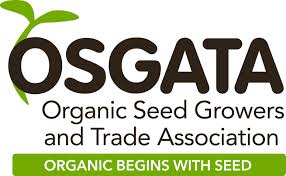Organic Farmers and Seed Companies Make Clear They Reject Proposed Mandatory Tax on Organic Producers
 Washington, ME, May 19, 2015 – A just-concluded major referendum by the membership of the organic seed industry leader, Organic Seed Growers and Trade Association (OSGATA), was unanimously opposed to the “Organic Check-off” proposed by the Organic Trade Association (OTA). Significantly, not a single vote was cast in favor of the Organic Check-off and America’s organic farmers and seed growers reject the OTA’s mandatory tax on organics.
Washington, ME, May 19, 2015 – A just-concluded major referendum by the membership of the organic seed industry leader, Organic Seed Growers and Trade Association (OSGATA), was unanimously opposed to the “Organic Check-off” proposed by the Organic Trade Association (OTA). Significantly, not a single vote was cast in favor of the Organic Check-off and America’s organic farmers and seed growers reject the OTA’s mandatory tax on organics.
The OSGATA membership, comprised of certified organic farmers, seed companies, seed professionals, and affiliate organizations, is concerned that the proposed Organic Check-off will follow suit of other check-off programs in favoring large corporate businesses instead of small-scale family farmers and ranchers.
“The OSGATA membership has spoken loud and clear,” said Maine certified organic seed farmer Jim Gerritsen, President of OSGATA. “Organic farmers and seed growers resoundingly reject the OTA’s Organic Check-off proposal and our membership believes it’s important that organic farmers work together to defeat the industry’s mandatory tax on our livelihoods.”
Last week, the OTA, in collaboration with the GRO Organic Core Committee, formally petitioned the U.S. Department of Agriculture (USDA) to initiate a vote and requisite steps for implementing a proposed Organic Check-off program. The petition was made possible by a provision in the 2014 Farm Bill, but is still pending review by USDA for compliance with the Generic Research and Promotion Act. The Organic Check-off’s stated purpose, as lobbied by the OTA, is to promote the organic industry while also funding gaps in organic research.
Many in the organic community, including OSGATA members, are concerned that this mandatory national tax on organic producers and its resulting marketing strategy will favor the interests of large-scale producers, processors and retailers in the organic industry and make it more difficult for family-scale farmers to compete.
Other USDA Check-off mandatory tax programs have a history of restrictive promotion guidelines, further burdened by heavy bureaucracy, collections harassment, and a lack of financial accountability. There is little confidence that the proposed Organic Check-off will operate differently than other generic commodity check-off programs.
“The proposed Organic Check-off will not serve the interests of organic family farmers,” said fourth-generation Kansas farmer and certified organic seed grower Bryce Stephens, OSGATA Vice-President. “Our family has had experience with Wheat, Beef and Dairy Check-off programs. I encourage organic farmers to educate yourselves on the issue and reject the OTA proposal.”
Organic farmers or organizations opposed to the Organic Check-off proposal may add their names to the No Organic Check-off website.

